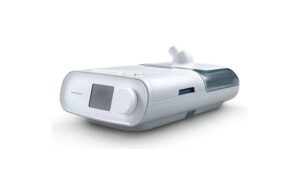
The DreamStation CPAP is among the devices involved in Philips’ respiratory devices recall. [Image courtesy of Philips]
Philips (NYSE:PHG) has issued an update on its ongoing Respironics recall issues that includes an update on the total reports received.
In 2021, Philips initiated a recall involving millions of CPAP and BiPAP ventilators and other respiratory devices for sleep apnea and more. These devices had sound abatement foam that could potentially degrade and get into the airways.
Philips Respironics effectively remains out of the sleep therapy market today. The most recent tally associated with reports to the FDA includes 260 deaths. Here’s a timeline of how the recall has played out.
In the company’s update issued yesterday, Philips acknowledged that Respironics relied on an initial, limited data set and toxicological risk assessment. It assumed a “reasonable worst-case scenario” for the potential health risks. Following public statements in April 2021 and the recall notification in June of that year, the company received ” a steep increase in complaints allegedly associated with possible foam degradation.”
A year and a half into the recall, Philips has now gained a better understanding of potential health risks, CEO Roy Jakobs said in the update. “I would like to stress that we are very sorry that it has taken this much time, but the testing involved long throughput times and needed to be done thoroughly. We deeply regret the concern and uncertainty felt by patients, their physicians, and customers, and continue to work hard to address their needs”
In a LinkedIn post today, Jakobs followed up by announcing the appointment of Steve C de Baca to the newly created role of chief patient safety and quality officer. “He brings more than 30 years of quality and regulatory affairs experience in the medical technology industry,” Jakobs said of de Baca. De Baca has held regulatory and quality positions at Cardinal Health, Zimmer Biomet, Boston Scientific and other companies. (Jakobs also announced the promotion of Jeff DiLullo to chief market leader of Philips North America.)
Philips updates on total reports received
Philips said this led to an increase of approximately 20,500 medical device reports (MDRs) filed by Philips Respironics to the FDA. These occurred between April 2021 and April 2022. Through the following six months, the company filed a further 70,500 MDRs. In November and December of last year, it added 8,300 MDRs to the tally.
That brings the total to approximately 99,000 MDRs filed from April 2021 up to and including December 2022, Philips said. (FDA adds that 346 reports mention death.)
Philips noted that “the vast majority” of the MDRs (93%) feature alleged malfunctions that don’t involve serious injury. The FDA’s MDR system remains a passive system with limitations. Submission of an MDR itself does not offer evidence of the device causing or contributing to the adverse outcome or event.
The company said it investigates all allegations of technical malfunction, serious injury or death.
“Based on the investigations to date, Philips Respironics has found no conclusive data linking these devices and the deaths reported in certain of these MDRs,” the company said in its update. An investigation of its recalled DreamStation sleep therapy devices showed that, among other things, exposure to certain emissions from the recalled devices is “unlikely to result in appreciable harm to health in patients.”
To date, Philips has completed more than 90% of the production required for the delivery of replacement devices in its planned remediation program.
This story originally ran on Feb. 9, 2023. Updated Feb. 10 with personnel announcement.

